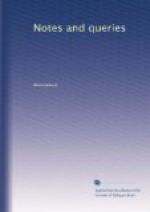“In 1745, being at that time secretary to Lord Chesterfield, in Holland, Mr. Dayrolles was nominated to be secretary to his lordship at Lord Lieutenant of Ireland.
“In May, 1747, he was promoted to be President in the United Provinces; and in November, 1751, Resident at Brussels, where he continued till August, 1757. He died in March, 1786.”
J.T.C.
* * * * *
Solomon Dayrolles.—
“24th Dec. 1786. Married Baron de Reidezel, aid-de-camp to the Duke of Wirtemberg, to Miss Dayrolles, 2d dau. of the late Solomon Dayrolles of Hanover Square.”—Gent. Mag. v. 56, p. 1146.
Probably Mr. Dayrolles’ death may be recorded in the register of St. George’s.
B.
* * * * *
Emerods (No. 18. p. 282.) pro haemorrhoids. “Golden emerods” would be an absurdity if emerod meant “emerald.” “The Philistines made golden emerods,” i.e. golden images of haemorrhoids (diseased veins), in commemoration of being delivered from plagues, of which such states of disease were concomitant signs.
TREBOR.
* * * * *
Military Execution (No. 16. p. 246.).—Your correspondent “MELANION” is informed that the anecdote refers to Murat, and the author of the sentiment is Lord Byron. See Byron’s Poems, Murray’s edit. 1 vol. 8vo. p. 561., note 4.
C.
* * * * *
“M. or N.” (No. 26. p. 415.)—I do not think that “M. or N.” are used as the initials of any particular words; they are the middle letters of the alphabet, and, at the time the Prayer Book was compiled, it seems to have been the fashion to employ them in the way in which we now use the first two. There are only two offices, the Catechism and the Solemnisation of Matrimony, in which more than one letter is used. In the former, the answer to the first question has always stood “N. or M.” In the office of Matrimony, however, in Edward the Sixth’s Prayer Books, both the man and woman are designated by the letter N—“I, N., take thee, N., to my wedded wife;” whilst in our present book M. is applied to the man and N. to the woman. The adoption of one letter, and the subsequent substitution of another, in this service, evidently for the sake of a more clear distinction only, sufficiently shows that no particular name or word was intended by either. Possibly some future “J.C.” may inquire of what words the letters “A.B.,” which our legislators are so fond of using in their Acts of Parliament, are the initials.
ARUN.
* * * * *
“M. or N.” (No. 26, p. 415.).—“M.” and “N.,” and particularly “N.,” are still in frequent use in France for quidam or quaedam; so also is X. We read every day of Monsieur N. or Madame X., where they wish to suppress the name.




